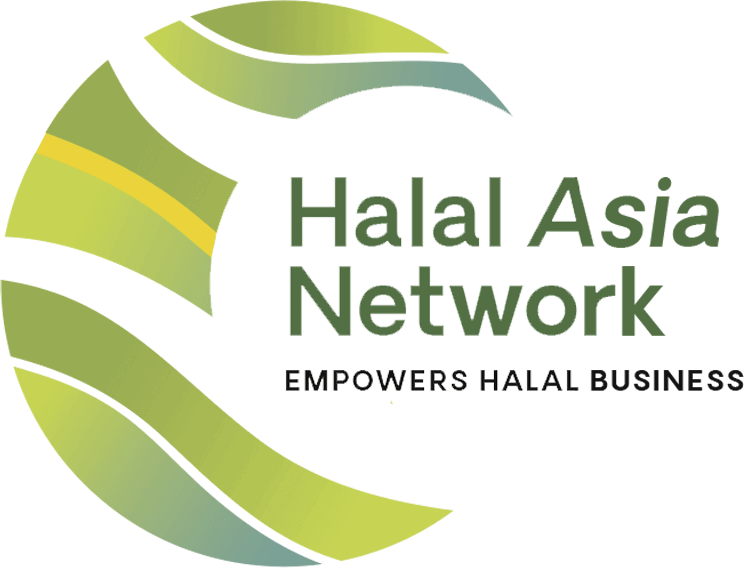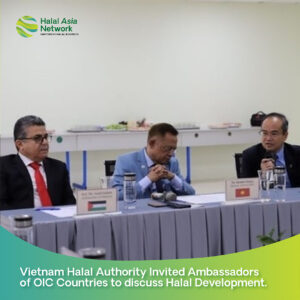The National Halal Certification Authority (HALCERT) of Vietnam held a meeting with 15 ambassadors from member countries of the Organization of Islamic Cooperation (OIC) to obtain direction regarding operational aspects of halal certification authorities and explore opportunities in the halal industries around the world. The meeting was led directly by Trần Quốc Dũng, Director of the Vietnam Certification Center (QUACERT), highlighting HALCERT’s vision and mission in developing the Halal Industry of Vietnam based on international standards and practices. Vietnam aims to strengthen its halal industry by following international halal standards and practices. Director of QUACERT underscores that Vietnam is ready to learn from OIC countries experience and ask for opportunities for the halal industry development in Vietnam. The National Halal Certification Authority (HALCERT) of Vietnam held a meeting with 15 ambassadors from member countries of the Organization of Islamic Cooperation (OIC) to obtain direction regarding operational aspects of halal certification authorities and explore opportunities in the halal industries around the world. The meeting was led directly by Trần Quốc Dũng, Director of the Vietnam Certification Center (QUACERT), highlighting HALCERT’s vision and mission in developing the Halal Industry of Vietnam based on international standards and practices. Vietnam aims to strengthen its halal industry in accordance with international halal standards and practices. Director of QUACERT underscores that Vietnam is ready to learn from OIC countries' experience and ask for opportunities to develop the halal industry in Vietnam.
Appreciation came from Saadi Salama, Ambassador of Palestine, to the government of Vietnam for its efforts in establishing HALCERT and called this initiative a significant step forward in elevating Vietnam’s level in terms of Halal Industries. Embark on this milestone. Ambassador Salama urges Vietnam to conduct further strategic planning to develop the halal industry effectively. One of the proposed actions is to increase public awareness regarding the importance of halal certification and encourage participation from the Muslim community in Vietnam to assist the government of Vietnam in facing many challenges and competition, especially from other countries with a larger Muslim community. In specific terms, Ambassador Salama pointed out the halal-friendly tourism sector, which has good potential for developing the halal industry in Vietnam.
Positive comments also come from Korhan Kemik, Ambassador of Turkey, which implies that the halal certification can also become a pull factor for non-Moslem consumers because this certification ensures the cleanliness of products, which positively impacts consumers' health. Ambassador Kemik highlights the importance of the establishment of the Unified Global Certification System, which is still not fully implemented and will bring significant benefits if the system is implemented. Ramlan Bin Osman, head of HALCERT, explains that the center is developing a strategy for the halal certification process based on the widely accepted standards and halal principles, mainly from the OIC. He also ensured that Vietnam would be open to any assistance from many OIC countries and responded to the readiness of OIC countries to assist Vietnam in developing its halal industry.
Assessment
Vietnam is a non-Muslim majority country in Southeast Asia, a region with high productivity and economic activities. Vietnam's approach to OIC countries is an important move to learn more about the appetite and preferences of these Muslim countries regarding products, goods, and services. Moreover, Vietnam also wants to know the technical aspects of the trade of halal products between Vietnam and OIC countries. With a majority Muslim population, Vietnam needs to adhere to halal principles, which are very influential in the consumption of Muslim people. With the rising competition in halal markets, especially from other countries in Southeast Asia, such as Thailand and two major Muslim countries in the region, Indonesia and Malaysia, Vietnam must take calculated measures to increase the competitiveness of its halal products. Adherence to halal principles is not enough to reach the OIC countries, as quality also becomes an essential aspect that must concern Vietnam.

